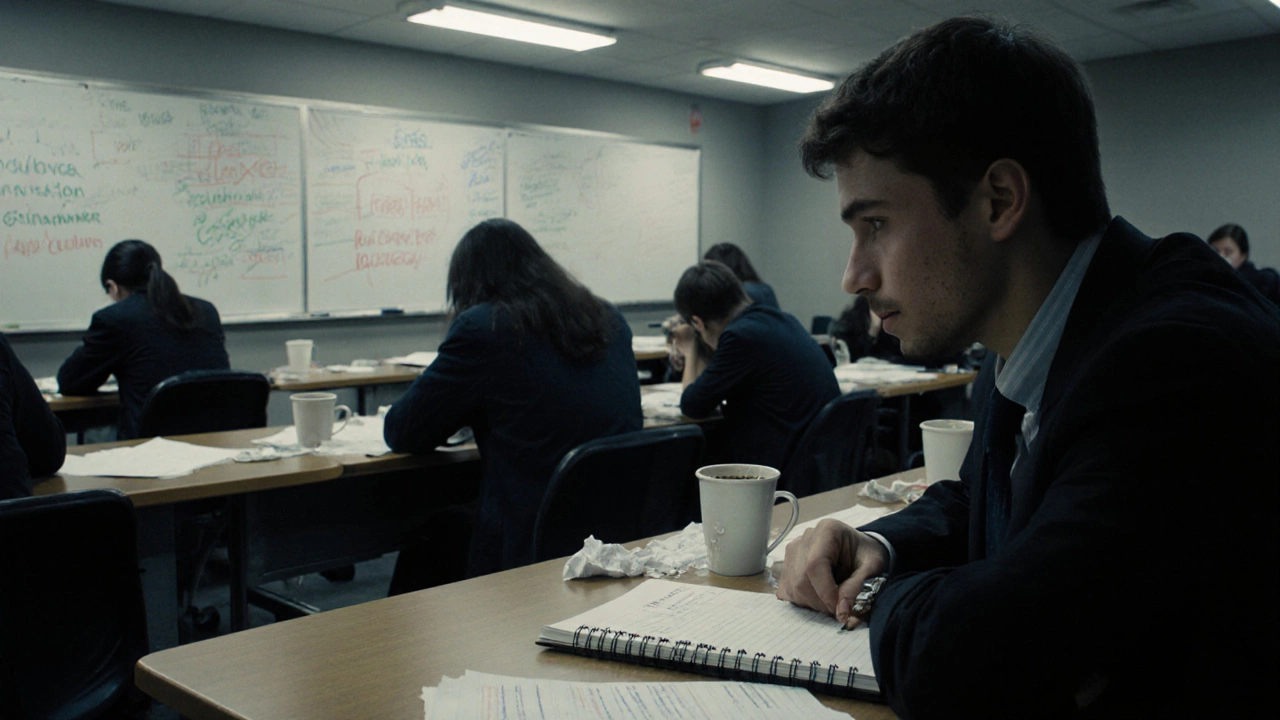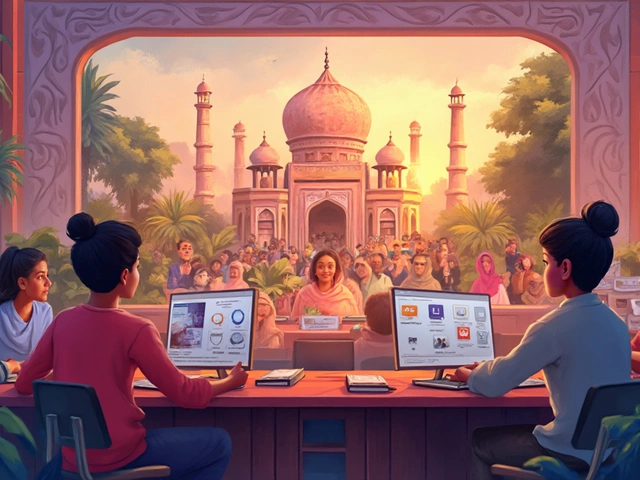There’s no single answer to which MBA is the toughest-but some programs are built to break you. Not because they’re unfair, but because they’re designed to push you past what you thought was possible. If you’re asking this question, you’re probably already wondering if you can handle the pressure. The truth? It’s not about the school’s name. It’s about the structure, the hours, the expectations, and the culture.
Harvard Business School: The Pressure Cooker
Harvard Business School doesn’t just teach case studies-it lives them. The average student spends 20-25 hours a week preparing for class, not including group work or extracurriculars. You’re expected to speak up in class, often cold-called, and defend your analysis in front of 90 peers. The grading system is brutal: only 10% of the class gets an H (High Honors). The rest are graded on a curve that forces you to compete against peers who’ve already led Fortune 500 teams or started unicorns. The workload isn’t just heavy-it’s relentless. Students report sleeping 4-5 hours a night during peak weeks. And it’s not uncommon for someone to cry in the bathroom after a failed case presentation.
Stanford GSB: The Emotional Marathon
Stanford’s MBA might not have the same number of hours as Harvard, but it’s harder in a different way. The program demands emotional intelligence as much as analytical skill. You’re not just solving business problems-you’re navigating team dynamics, personal identity, and career reinvention. The Leadership Development Program isn’t optional. It’s a series of 360-degree feedback sessions, coaching, and vulnerability exercises that force you to confront your weaknesses in front of peers and mentors. Many students say the emotional toll is worse than the academic load. You’ll spend nights rewriting your personal narrative for job interviews, while also managing a startup incubator or leading a student club. Stanford doesn’t just want leaders. It wants leaders who know themselves.
London Business School: The Global Gauntlet
London Business School packs a two-year program into 18 months. That means you’re running a marathon with no finish line in sight. The curriculum is intense: core courses in finance, strategy, and analytics are taught at a graduate level, but you’re expected to master them in half the time of most U.S. programs. You’ll take exams every three weeks. Group projects run nonstop. And if you want to switch tracks-say, from finance to marketing-you have to do it in 60 days, with no time to catch your breath. International students face extra pressure: visa timelines, job search windows, and the need to prove themselves in a competitive London market. The average student works 70+ hours a week. Many drop out because they can’t sustain it.

Wharton: The Numbers Game
Wharton is where finance meets ferocity. The quantitative rigor is unmatched. You’ll take courses in corporate finance, econometrics, and data modeling that require advanced math skills-even if you’re an English major. The grading curve is tight. Midterms and finals are brutal. The school doesn’t care if you’re tired. It cares if you can build a DCF model in 90 minutes under pressure. The peer network is stacked: 40% of the class comes from top consulting firms or investment banks. You’ll be outworked by someone who did three internships before undergrad. And if you’re not fluent in Excel, Python, or Bloomberg terminals by week three, you’re already behind. The hardest part? Everyone around you is equally brilliant-and they’re not holding back.
INSEAD: The Speed Round
INSEAD’s one-year MBA is the fastest, and arguably the most punishing. You get 10 months to do what other schools do in 24. There’s no summer break. No time to recover. You’ll move from France to Singapore in the middle of the program, adjust to a new time zone, culture, and academic style-all while taking finals. The case load is insane: 8-10 cases per class, every day. Group work is non-stop. You’ll be assigned to teams with people from 15 different countries, each with different work styles. One student told me they spent 36 hours straight preparing for a presentation, then slept for 4 hours before flying to Singapore. The attrition rate is low, but the mental fatigue is high. If you’re looking for balance, this isn’t it.

What Makes an MBA Tough? It’s Not Just the Workload
Some programs are hard because of the volume. Others are hard because of the stakes. The toughest MBAs don’t just test your brain-they test your resilience, your adaptability, and your self-belief. The real challenge isn’t passing the exam. It’s staying sane while doing it. Many students who survive these programs say the same thing: they didn’t learn finance or marketing the most. They learned how to lead when exhausted, how to speak up when afraid, and how to keep going when everyone else seems ahead.
Is the Toughest MBA Right for You?
Not everyone needs to survive Harvard or INSEAD to succeed. If you’re aiming for a corporate role in a stable industry, a less intense program might serve you better. If you want to pivot careers, launch a startup, or enter consulting, then the pressure of a top program can be worth it. But ask yourself: Are you ready to sacrifice sleep, relationships, and mental peace for two years? Can you handle being told you’re not good enough-even when you’re already excellent? If the answer is yes, then go for it. If not, there are other paths to leadership that don’t require burning out.
Bottom Line: The Hardest MBA Is the One That Matches Your Limits
There’s no trophy for surviving the toughest program. The real win is walking out with clarity, confidence, and a network that lasts a lifetime. Some people thrive under pressure. Others break. The best MBA isn’t the one with the highest rankings-it’s the one that pushes you just enough without crushing you. Know yourself. Know your limits. And choose accordingly.
Is the Harvard MBA really the hardest?
Harvard is one of the hardest, but not for the reasons most people think. It’s not just the case studies or the grading curve-it’s the expectation that you’ll lead every discussion, every group project, and every career move. The pressure comes from the culture: everyone around you is high-achieving, and silence is seen as weakness. If you’re not used to being constantly on display, it can be overwhelming.
Can you survive an MBA without sacrificing your mental health?
Yes-but only if you set boundaries early. Top programs don’t offer mental health support because they expect you to manage it yourself. The students who survive best are the ones who schedule downtime, limit social media, and say no to extra commitments. Therapy, meditation, and regular exercise aren’t luxuries-they’re survival tools. Schools like Stanford and LBS have better support systems, but the responsibility still falls on you.
Do employers care which MBA is the toughest?
Not directly. Employers care about the skills you bring, the network you built, and the results you delivered. But if you come from Harvard, Wharton, or INSEAD, you get access to exclusive recruiting pipelines. The toughness of the program often correlates with the quality of the alumni network and the caliber of companies that recruit there. So while they don’t ask, “Did you survive Harvard?” they do notice the name-and the confidence it signals.
Is a one-year MBA harder than a two-year MBA?
Yes, if you’re comparing INSEAD or London Business School to a traditional two-year program. The compressed timeline means no summer internship, no time to reset, and constant pressure to perform. You’re expected to learn, network, and job-hunt all at once. Two-year programs give you breathing room-especially for career changers. But one-year MBAs are designed for people who already know what they want. For them, the speed is a feature, not a flaw.
What’s the dropout rate in top MBA programs?
Formal dropout rates are low-usually under 5%. But many students quietly withdraw from the experience. They stop attending events, skip group work, or mentally check out. The real attrition isn’t official-it’s emotional. Students who feel isolated, overwhelmed, or unprepared often leave the program emotionally, even if they stay enrolled. That’s why peer support and mentorship matter more than grades.
If you’re considering a top MBA, don’t just chase prestige. Ask yourself: What kind of pressure can you handle? What kind of person do you want to become? The toughest MBA isn’t the one with the hardest exams-it’s the one that changes you the most.










